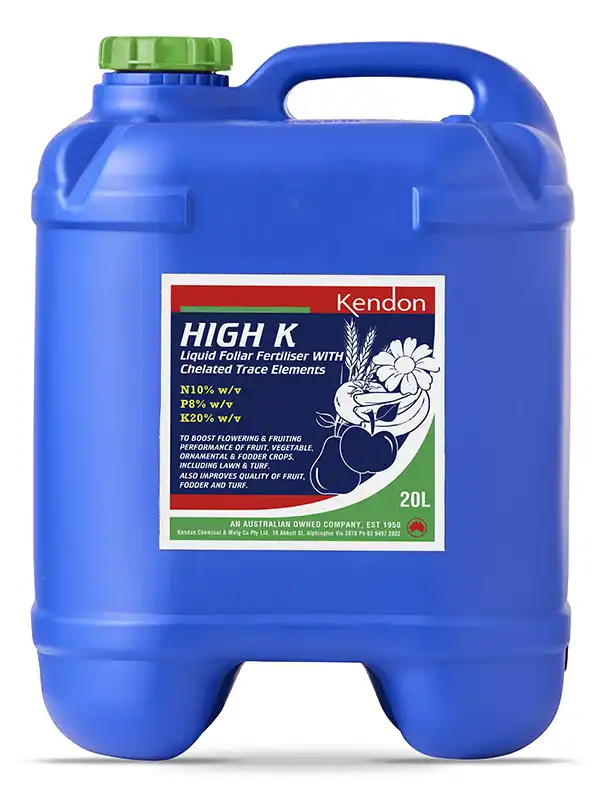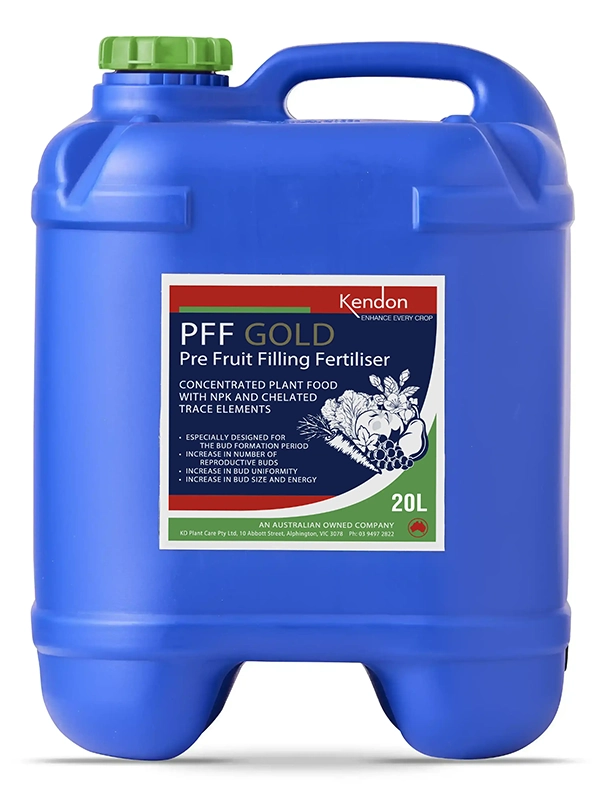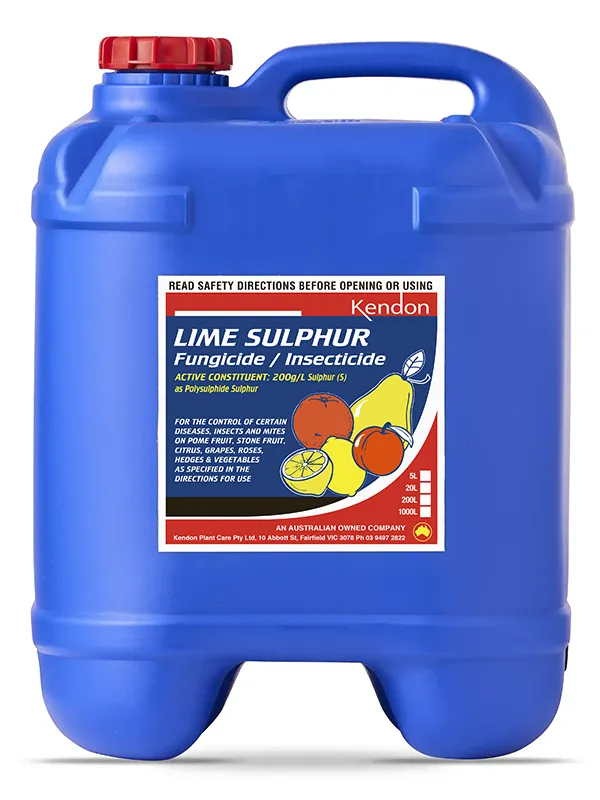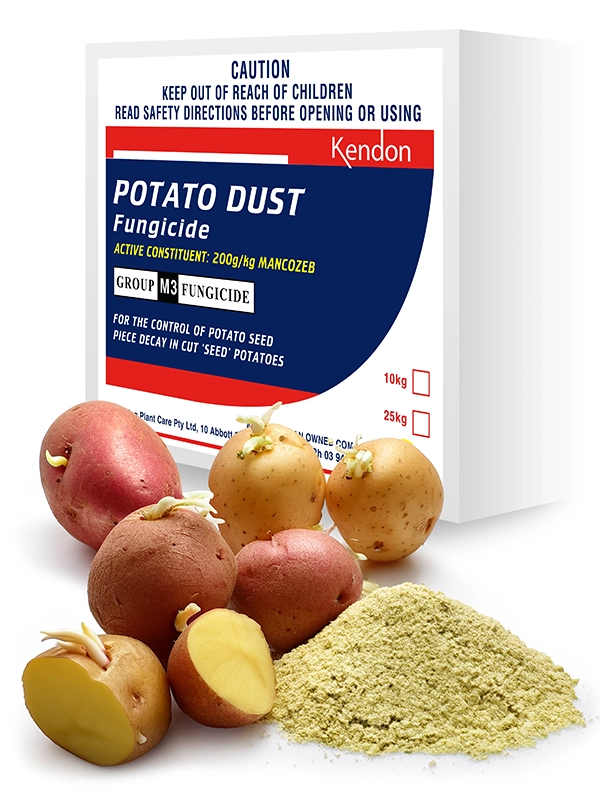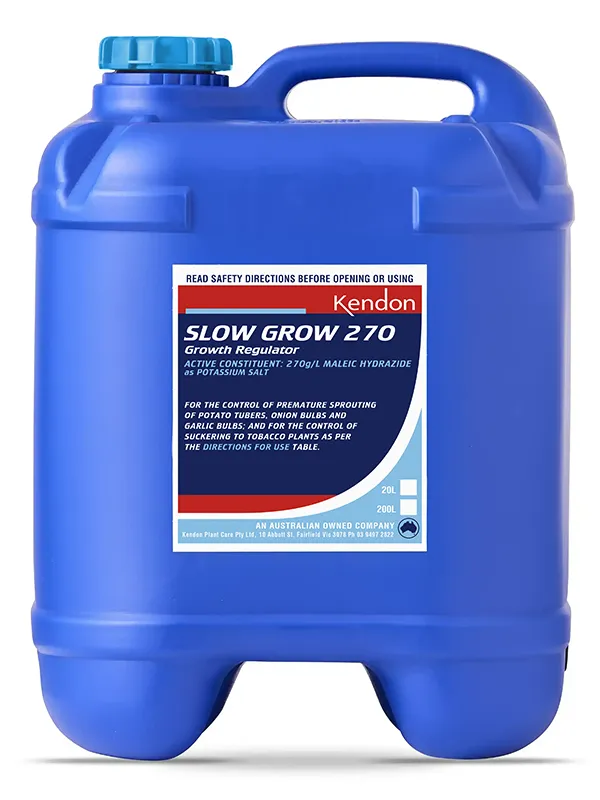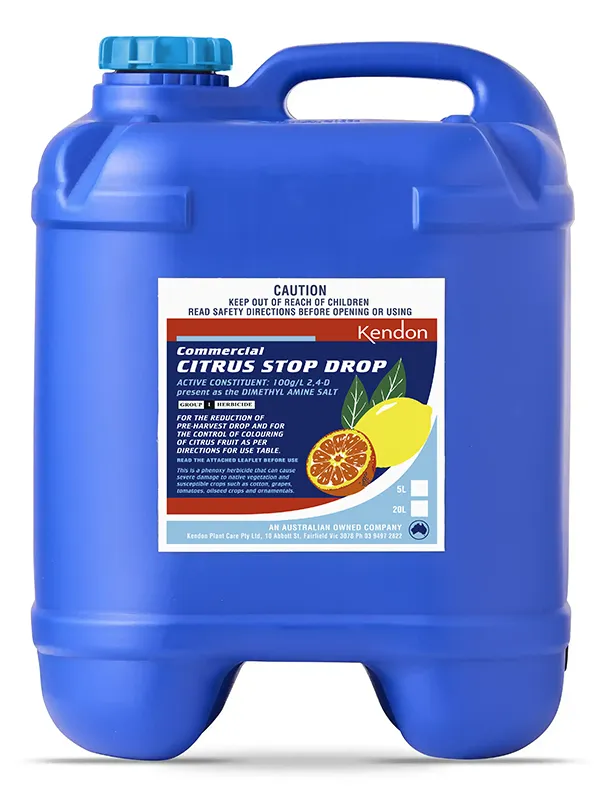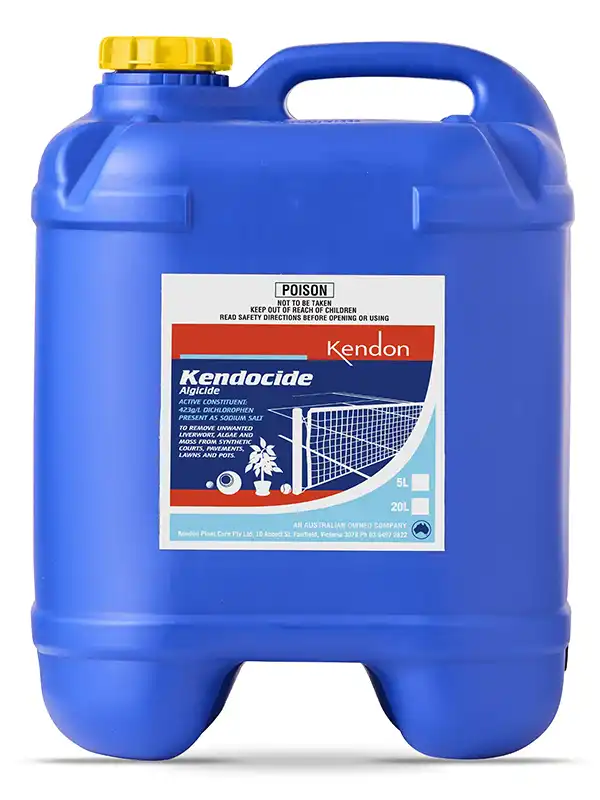Mancozeb FUNGICIDE
800WP & 750WG Agricultural Fungicides
Mancozeb Fungicide - 800WP & 750WG
Kendon Mancozeb is a broad spectrum contact fungicide providing protective action against fungal diseases in vegetables, fruit, field crops, tobacco, turf, and ornamentals . Discovered in 1961, Mancozeb is a complex molecule containing manganese and zinc as active components, reacting with amino acids and enzymes of fungal cells to disrupt cellular functions .
Available in two formulations – Mancozeb 800WP and Mancozeb 750WG – both offering reliable disease control through multi-site protective action.
| Mancozeb 800WP | Mancozeb 750WG | |
|---|---|---|
Application |
Kendon holds APVMA registration for BANANAS in Australia. Effectively controls Black pit, Leaf spot (Sigatoka disease), Cordana leaf spot, fruit & leaf speckle, Anthracnose in Bananas. |
Frequently used to manage blight, mildew, anthracnose, rust, scab, leaf spot and similar diseases in fruits, vegetables, field crops, turf, tobacco, and ornamentals. |
| Frequently used to manage blight, mildew, anthracnose, rust, and similar diseases in fruits, vegetables, field crops, turf, tobacco, and ornamentals. | ||
Product Type |
Fungicide | |
Group |
M3 | |
Active Ingredient |
800g/kg Mancozeb | 750g/kg Mancozeb |
Pack Size |
2Kg, 25Kg | 2Kg, 5Kg, 10Kg, 15Kg, 20Kg |
Formulation |
Wettable Powder | Water Dispersible Granules |
APVMA Registration # |
66679 / 54178 | 53223 / 139809 |
| Search APVMA numbers at APVMA PubCRIS. | ||
Acute Oral Toxicity (LD₅₀) |
>5000mg/kg in rats (low toxicity) | |
Mixing |
Requires thorough mixing | Disperses rapidly in water |
Environmental Profile |
Breaks down rapidly in soil and water - does not bioaccumulate | |
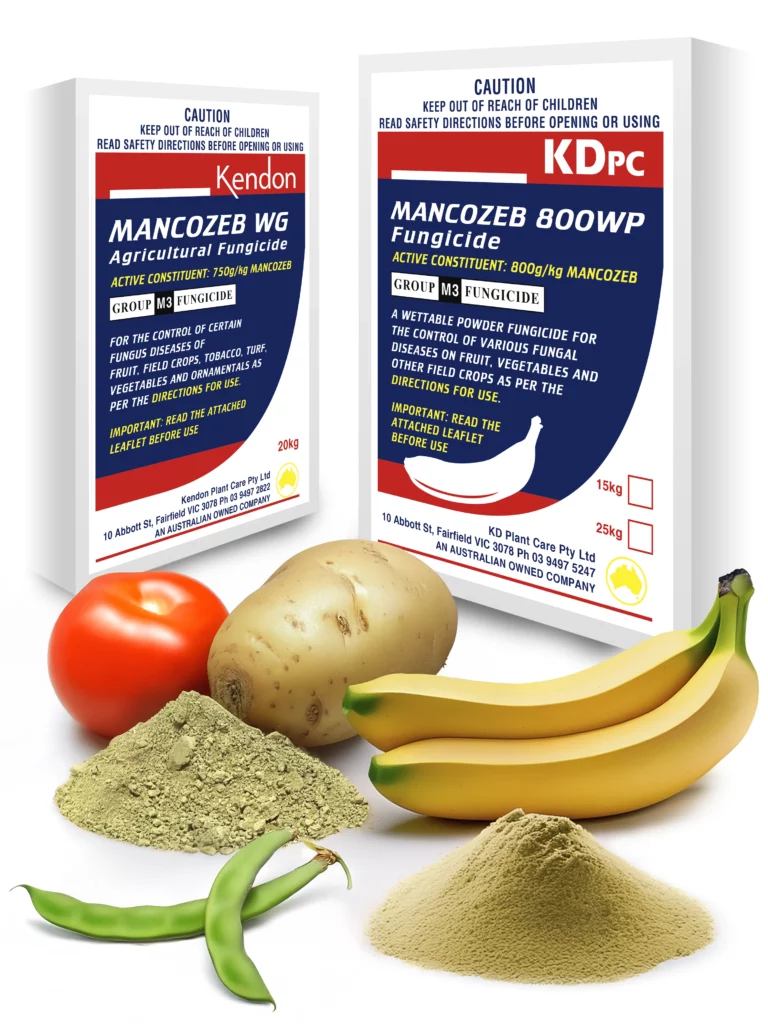
Request for SDS please
Key Features & Benefits
- Broad spectrum control - effective against blight, mildew, rust, scab, and other fungal diseases
- Contact fungicide with protective, non-systemic action
- Multi-site activity - Group M3 classification reduces resistance development
- Good compatibility with most agricultural chemicals
- Resists weathering and suitable for concentrate applications
- Rapidly degrades in environment without bioaccumulation
- Low absorption and rapid excretion in animals.
What is Mancozeb and how does it work as a fungicide?
Mancozeb is a broad spectrum contact fungicide belonging to the dithiocarbamate group, specifically classified as Group M3 for resistance management. It works by interfering with multiple enzyme systems in fungal cells, disrupting cellular processes and preventing spore germination. Unlike systemic fungicides, Mancozeb provides protective action on plant surfaces where it's applied.
Is Mancozeb a systemic or contact fungicide?
Mancozeb is a contact fungicide, not systemic. This means it works by direct contact with fungal spores and mycelium on treated plant surfaces, providing protective action rather than moving through the plant's vascular system.
What is the active ingredient in Mancozeb and how much should I use?
Mancozeb contains manganese and zinc as a coordination complex with ethylene bisdithiocarbamate. Application rates typically range from 150-200g per 100L for dilute sprays, or 1.7-6kg per hectare depending on crop and disease.
What crops and diseases can I treat with Mancozeb fungicide?
Mancozeb effectively controls fungal diseases on vegetables (tomatoes, potatoes, beans), fruit crops (citrus, stone fruit, grapes), ornamentals, turf, and field crops. Common diseases controlled include early and late blight, downy mildew, black spot, rust, anthracnose, and scab.
How do I apply Mancozeb 800WP for various crops and diseases, especially Bananas?
Kendon holds APVMA registration for BANANAS in Australia. This product effectively controls Black pit, Leaf spot (Sigatoka disease), Cordana leaf spot, fruit & leaf speckle and Anthracnose in Bananas.
See the table below for a full list of crops and diseases controlled, plus application rates.
(Always read the label prior to use)
| Crop | Disease Controlled | State | Rate / 100L or Per Ha | Withholding Period | Critical Comments |
|---|---|---|---|---|---|
| POME FRUIT Apples & Pears |
Black Spot (not apples WA) Bitter Rot, Fly Speck, Sooty Blotch | All States (except WA for Black Spot) | 150-200g / 100L or 3-6kg / ha |
14 days | Apply at 7-14 day intervals throughout the season. Begin following cover copper spray at green tip. Use higher rate or shorter interval between sprays where conditions favour disease. Add spreader sticker if necessary. |
| STONE FRUIT Peaches, Apricots, Plums (except Wilson Plums) |
Rust, Shot Hole or Freckle | All States | 150g / 100L or 3-6kg / ha |
14 Days | Apply at early blossom. Apply at full bloom, petal fall and shuck fall. And then at intervals of 14 days. |
| Brown Rot | VIC, TAS, SA & NSW only | ||||
| Nectarines | SA & TAS only | 150-200g / 100L or 3-6kg / ha |
Spray at early bloom (1-10%), mid to full bloom (50-100%), petal fall and shuck fall, then at intervals of 14 days. | ||
| Almonds | SA only | ||||
| BANANAS | Black Pit, Cordana Leaf Spot, Fruit Speckle, Leaf Speckle (suppression) | QLD only | 1.25kg plus 4-6L / ha of DC Tron or BP Banana Misting Oil | 1 Day | Apply when weather conditions favour disease outbreak. Repeat treatments in accordance with locally recommended spray schedules. North Queensland: Apply every two weeks during the wet season. Extend to three weeks after this and then four to five weeks during the drier months, returning to three weeks prior to the next wet season. South Queensland: Apply at three week intervals from December or January until May. Note: If the 14 day interval is extended due to rain or other factors, it is recommended that a systemic eradicatant fungicide be integrated within the basic spray program. KDPC Mancozeb WP should be applied again 7 days aftetr the last eradicant application and then continued on the 14 day schedule. |
| Leaf Spot (Sigatoka Disease) (Mycosphaerella musicola) | QLD & WA only | 2.2-4.5kg plus 4L / ha oil as above | 14 Days | ||
| Black Pit, Cordana Leaf Spot, Fruit Speckle, Leaf Speckle | QLD only | 2.2kg plus 4L / ha oil as above | |||
| Anthracnose (Colletotrichum musae) | NSW only | 2.2-3.5kg plus 4L oil / ha | |||
| Leaf Spot (Sigatoka Disease) (Mycosphaerella musicola) | NSW only | 2.2kg plus 4L oil / ha | |||
| CELERY | Septoria Leaf Spot | All States | 150-200g / 100L or 1.7-2.2kg / ha |
7 Days | Apply when disease first appears and repeat at 7-10 day intervals. Under severe conditions, use shorter intervals and higher rate. Add wetting agent. |
| BEANS French & Faba |
Rust, Anthracnose | All States | 150-200g / 100L or 1.7-2.2kg / ha |
7 Days | Apply when disease first appears and then repeat treatment at 7-10 day intervals. Under severe disease conditions, use shorter spray intervals and higher rate of application. |
| Angular Leaf Spot | QLD & NSW only | Spray at first signs of disease. Repeat at 7-10 day intervals. For improved coverage and spray retention add a spreader-sticker at recommended label rates | |||
| Chocolate Spot (Botrytis fabae) | NSW, TAS, SA & VIC only | ||||
| Suppression of Leaf Blight (Ascochyta fabae) | NSW, TAS & SA only | ||||
| Rust (Uranyces viciae-fabae) | NSW, TAS, VIC & SA only | ||||
| CITRUS | Black Spot | NSW, VIC, SA & TAS only | 200g + 250ml Summer Oil / 100L or 8-16kg / ha |
14 Days | On heavy soil: Spray at 8 and 15 weeks following Bordeaux (5-5-100) spray at petal fall. On light soil: Spray at 6 and 13 weeks following Bordeaux (3.5-3.5-100) spray plus 12ml wetting agent at petal fall. |
| QLD only | 200g plus 600ml Summer Oil / 100L | Apply 6 and 12 weeks after petal fall following Bordeaux mixture (8-8-100) or copper oxychloride at 1/2 to 3/4 petal fall. | |||
| Brown Citrus Mite, Citrus Rust Mit | Apply at first sign of mite activity on fruit usually between December and May. | ||||
| Citrus Bud Mite | Apply when blossom malformation is observed between December and May. | ||||
| CUCURBITS Cucumber, Pumpkin, Cantaloupe, Melons, Squash, Zucchini |
Downy Mildew, Anthracnose, Gummy Stem Blight | All States | 150-200g / 100L or 1.7-2.2kg / ha |
7 days | Apply when disease symptoms first appear and then repeat at 7-10 day intervals. Use the higher rate and shorter spray interval during weather conditions favourable to disease development. |
| Pumpkin | Septoria Leaf Spot | QLD only | |||
| GRAPES | Black Spot | All States | 200g / 100L or 2-3kg / ha |
14 Days | Apply every 10-14 days starting at budburst. |
| Downy Mildew | QLD, NSW, VIC, SA & TAS only | Apply at intervals of 10-14 days starting when shoots are 15-20cm long. | |||
| Dead Arm | QLD only | Spray at budburst and then repeat 7-10 days later. | |||
| MANGOES | Anthracnose | QLD & NSW only | 200g / 100L or 2-3kg / ha |
14 Days | Apply weekly during flowering, then monthly until near harvest. Add approved wetting/sticking agent at recommended rate. |
| ONION - Bulb | Downy Mildew | All States | 2.2-3.5kg / ha | 7 Days | Apply at first sign of disease. Repeat at 7-10 day intervals during period of high risk. |
| Purple Blotch | QLD only | ||||
| CHRYSANTHEMUMS, GLADIOLI | Botrytis or Septoria Leaf Blights, Grey Mould | All States | 150-200g / 100L | - | Spray at first sign of disease and repeat at 7-10 day intervals as required. |
| PASSIONFRUIT | Brown Spot (Alternaria passiflorae), Septoria Spot | QLD only | 150g / 100L water or 1.7kg / ha |
14 Days | Apply at 10-14 day intervals from October to May and every 21-28 days for remainder of year. |
| Anthracnose | NSW only | 200g plus 600ml Summer Oil / 100L or 2-3kg / ha |
Spray at weekly intervals during flowering and then fortnightly until near harvest. | ||
| PEANUTS | Cercospora Leaf Spot | WA, NSW & QLD only | 1.7-2.2kg plus 70ml Spreader Sticker / ha | 14 Days | Apply at 10-14 day intervals starting when crop is ~8 weeks old. For Rust, use 7-10 day intervals. |
| Peanut Rust | WA, NSW & QLD only | ||||
| POTATOES | Early & Late Blight | All States | 1.7-2.2kg / ha | 7 Days | Apply when symptoms appear or when plants 5-15cm high. Repeat at 7-10 day intervals. Use shorter interval/higher rate under severe disease. |
| ROSES | Black Spot | All States | 150-200g / 100L | - | Spray at first sign of disease and repeat at 7-10 day intervals after flowering. |
| RHUBARB | Downy Mildew | All States | 150-200g / 100L or 1.7-2.2kg / ha |
14 Days | Apply when disease threatens and repeat at 7-10 day intervals. |
| Rust | NSW only | ||||
| SOYBEANS | Soybean Rust | All States | 2.2kg / ha | 7 Days | Apply when disease first appears and then at 7 day intervals after flowering. |
| TOMATOES | Early & Late Blight, Leaf Mould, Anthracnose | All States | 1.7-3.5kg / ha | 14 Days | Do not apply to seedlings before transplanting. Begin application when disease first appears. Repeat at 7-10 day intervals throughout the season. |
| Grey Leaf Spot, Phoma Rot | NSW & QLD only | 2-3kg / ha | |||
| TURF | Helminthosporium Disease Patch, Rhizoctonia Brown Patch | All States | 180-250g / 100m² | - | Apply every 7 days when conditions favour disease spread. Apply in sufficient water to obtain adequate coverage of area to be treated. |
| VEGETABLES Beetroot, Silver Beet, Spinach |
Cercospora Leaf Spot, Downy Mildew | All States | 150-200g / 100L | 14 Days | Apply when disease first threatens and repeat at 7-10 day intervals. |
| Brussels Sprouts, Cabbage, Cauliflower | Downy Mildew, Anthracnose, Alternaria Spot, Ring Spot | 7 Days | |||
| Lettuce | 14 Days | ||||
| Broccoli | NSW, WA, TAS, SA & QLD only | 1.7-2kg / ha | 7 Days | Spray at first sign of disease. Repeat at 7-10 day intervals. |
What are the application rates for Mancozeb 750WG on different crops?
See the table below for a full list of crops and diseases controlled, plus application rates.
(Always read the label prior to use)
| Crop | Disease | State | Rate / 100L | Rate / Ha | Withholding Period | Critical Comments * Refer to Surfactants Section |
|---|---|---|---|---|---|---|
| VEGETABLES Tomatoes |
Early Blight (Target Spot), Late Blight (Irish Blight), Anthracnose Leaf Mould | All States | 150g - 200g | 2kg - 3kg | 14 Days | Apply when disease symptoms first appear and then repeat at 7-10 day intervals. Use the higher rate and shorter spray interval during weather conditions favourable to disease development. Spray when leaves, flowers or pods on most plants first show signs of infection and weather conditions are likely to remain humid or wet and favour disease development. |
| Gray Leaf spot, Phoma Rot | NSW & QLD Only | |||||
| Beans Broad Beans (including Faba Beans) |
Rust, Anthracnose | All States | 150g - 200g | 1.7kg - 2.2kg | 7 Days | Apply when disease symptoms first appear and then repeat at 7-10 day intervals. Use the higher rate and shorter spray interval during weather conditions favourable to disease development. Spray when leaves, flowers or pods on most plants first show signs of infection and weather conditions are likely to remain humid or wet and favour disease development. |
| Angular Leaf Spot | NSW & QLD Only | |||||
| Chocolate Spot (Botrytis fabae) | NSW, TAS, VIC & SA Only | 1.7kg - 2.5kg | ||||
| Supression of Leaf Blight (Ascochyta fabae) | ||||||
| Rust (Uromyces viciae-fabae) | 1.7kg - 2.2kg | |||||
| Celery | Septoria Leaf Spot (Light Blight) | All States | 150g - 200g | 1.7kg - 2.2kg | 7 Days | Apply when disease symptoms first appear and then repeat at 7-10 day intervals. Use the higher rate and shorter spray interval during weather conditions favourable to disease development. |
| Carrots | Cercospora Leaf Spot, Alternaria Leaf Spot | All States | 150g - 200g | 1.7kg - 2.2kg | 7 Days | Apply when disease symptoms first appear and then repeat at 7-10 day intervals. Use the higher rate and shorter spray interval during weather conditions favourable to disease development. |
| Onions | Downy Mildew | All States | 150g - 200g | 2.2kg - 3.5kg | 7 Days | Apply when disease symptoms first appear and then repeat at 7-10 day intervals. Use the higher rate and shorter spray interval during weather conditions favourable to disease development. |
| Purple Blotch | NSW & QLD Only | |||||
| Lettuce | Downy Mildew, Anthracnose, Septoria leaf Spot | All States | 150g - 200g | 1.7kg - 2.2kg | 14 Days | Apply when disease symptoms first appear and then repeat at 7-10 day intervals. Use the higher rate and shorter spray interval during weather conditions favourable to disease development. |
| Spinach, Silverbeet, Beetroot | Downy Mildew, Cercospora Leaf Spot | All States | 150g - 200g | 1.7kg - 2.2kg | 14 Days | Apply when disease symptoms first appear and then repeat at 7-10 day intervals. Use the higher rate and shorter spray interval during weather conditions favourable to disease development. |
| Rhubarb | Rust | TAS Only | 150g - 200g | 1.7kg - 2.2kg | 14 Days | Apply when disease symptoms first appear and then repeat at 7-10 day intervals. Use the higher rate and shorter spray interval during weather conditions favourable to disease development. |
| Downy Mildew | All States | |||||
| Potatoes | Downy Mildew, Early Blight (Target Spot), Late Blight (Irish Blight) | All States | 150g - 200g | 1.7kg - 2.2kg | 14 Days | Apply when disease symptoms first appear and then repeat at 7-10 day intervals. Use the higher rate and shorter spray interval during weather conditions favourable to disease development. |
| COLE CROPS
Cabbage, Cauliflower, Brussels Sprouts |
Anthracnose, Downy Mildew, Alternaria Spot, Ring Spot | All States | 150g - 200g | 1.7kg - 2.2kg | 7 Days | Apply when disease symptoms first appear and then repeat at 7-10 day intervals. Use the higher rate and shorter spray interval during weather conditions favourable to disease development. |
| Broccoli | NSW, WA, SA, TAS & QLD Only | |||||
| CUCURBITS Cucumber, Canteloupe, Pumpkins, Melons, Zucchini, Squash |
Downy Mildew, Anthracnose, Gummy Stem Blight, Septoria Spot | All States | 150g - 200g | 1.7kg - 2.2kg | 7 Days | Apply when disease symptoms first appear and then repeat at 7-10 day intervals. Use the higher rate and shorter spray interval during weather conditions favourable to disease development. |
| Septoria Spot | ||||||
| FRUITS POME FRUIT Apples, Pears |
Pear Scab, Apple Scab (Black Spot) | All States | 150g - 200g | 3kg - 6kg | 14 Days | * Apply at 7-14 day intervals following a copper spray at green tip. Use the higher rate and shorter spray interval during prolonged wet conditions. Mancozeb WG Agricultural fungicide can be tank mixed with Topas 100EC for the control of apple scab (black spot). Read and follow all recommendations on the manufacturers label. Mancozeb WG Agricultural fungicide may be harmful to Typhlodromus pyri, and its use in orchards where integrated control is practiced, should be avoided. |
| Apple Scab (Black Spot) | VIC, TAS, SA, QLD & NSW Only | |||||
| Target Spot, Bitter Rot, Sooty Blotch, Fly Speck | All States | |||||
| Ripe Fruit Spot | QLD Only | |||||
| STONE FRUIT Peaches, Apricots, Plums (except Wilson Plums) |
Rust, Shot Hole, Freckle | All States | 150g - 200g | 3kg - 6kg | 14 Days | * Apply at early bloom (1-10%), then repeat at mid to full bloom (50-100%) at petal fall and shuck fall.
Continue with a protective spray program at two week intervals. |
| Brown Rot | VIC, TAS, SA & NSW Only | |||||
| Cherries | Brown Rot | VIC & TAS Only | ||||
| Nectarines | Brown Rot | SA & TAS Only | ||||
| Almonds | Brown Rot | SA Only | ||||
| OTHER FRUIT
Bananas |
Leaf Spot (Mycosphaerella Musicola) | NSW & QLD Only | 200g Mancozeb WG
plus 600ml polyphase summer oil |
2.2kg - 4.5kg Mancozeb WG (NSW 2.2kg) plus 3.5L - 4.2L polyphase summer oil or miscible summer oil | 7 Days | * Apply when weather conditions favour disease outbreak. Repeat treatments in accordance with locally recommended spray schedules. Use sufficient water to ensure good coverage.
New South Wales: Ground application - Apply at three week intervals from December or January until May. Aerial Application: Apply at 7-10 day intervals from December or January until May. South Queensland: Apply at three week intervals from December or January until May. North Queensland: Apply every two weeks during the wet season. Extend to three weeks after this and then to four to five weeks during the drier months returning to three weeks pror to the next wet season. |
| Leaf Speckle | QLD Only | 200g | 2.2kg | |||
| Cordana Leaf Spot, Fruit Speckle, Black Pit | QLD Only | |||||
| Passion Fruit | Septoria Spot, Brown Spot (Alternaria Pasiflorae) | QLD Only | 150g | 1.7kg | 14 | Apply at 10-14 day intervals from October to May and every 21-28 days for remainder of year. |
| Mangoes | Anthracnose (Collectotrichum gloeosporiodes) | QLD Only | 200g | 2kg - 3kg | 14 Days | * Apply at weekly intervals during flowering and then at monthly intervals until near harvest. |
| Grapevines | Black Spot | All States | 200g | 2kg - 3kg | 14 Days | * For black spot control apply at budburst and then repeat 10-14 days later. If downy mildew is expected, continue spray program at 10-14 day intervals until the threat of disease has passed. Use the shorter spray interval during weather conditions favourable to disease development. |
| Downy Mildew | NSW, QLD, TAS, VIC & SA Only | |||||
| Dead Arm | QLD Only | 150g - 200g | Apply at budburst and then repeat 7-10 days later. | |||
| Citrus | Black Spot | NSW, QLD, TAS, VIC & SA Only | 200g | 8kg - 16kg | - | On Heavy Soil: Add 250ml polyphase summer oil. Spray at 8 and 15 weeks following a Bordeaux (5-5-100) spray at petal fall.
On Light Soil: Add 250ml polyphase summer oil plus 12ml LATRON B-1956 as a spreadersticker. Spray at 6 and 13 weeks following a Bordeaux (3.5-3.5-100) spray at petal fall. Queensland: Add 600ml polyphase summer oil or miscible summer oil per 100L and spray at 6 and 12 weeks after a copper spray at 1/2 to 3/4 petal fall. Apply at first sign of mite activity on fruit, usually between December and May. Apply when blossom malformation is observed, usually in February. |
| Citrus Rust Mite, Brown Citrus Mite | QLD Only | |||||
| Citrus Bud Mite | ||||||
| FIELD CROPS Peanuts |
Cercospora Leaf Spot, Rust | NSW, QLD & WA Only | - | 1.7kg - 2.2kg | 14 Days | * Apply at 10-14 day intervals commencing
when disease symptoms first appear. If rust is
anticipated, apply at 7-10 day intervals.
Use the higher rate and shorter spray interval during weather conditions favourable to desease development. Do not graze livestock on peanut crops treated with Mancozeb WG or feed treated crops and / or trash to livestock. |
| Soybeans | Rust | NSW & QLD Only | - | 2kg | 7 Days | * Apply when disease symptoms first appear
and repeat at 7-10 day intervals while warm
rainy weather conditions prevail.
Do not graze livestock on soybean crops treated with Mancozeb WG or feed treated crops and / or trash to livestock. |
| Tobacco | Blue Mould, Brown Spot | NSW, QLD & VIC | 200g | 2.2kg | - | * Field Treatments: Apply at 7 day intervals
commencing 10 days after transplanting and
ceasing 7-10 days before the first harvest.
Increase the spray volume accordingly as plant
size increases.
Seed Bed Treatment: Apply when seedlings are 1.5cm across and then repeat twice weekly. Wet the seedlings evenly without runoff. |
| Frog Eye Leaf Spot | QLD Only | 2.1kg | ||||
| Turf | Fusarium, Rhizoctonia, Helminthosporium | All States | 200g - 250g / 100m2 | - | Apply as a protective spray schedule at 7 day intervals throuoghout the susceptible season. Use sufficient water for adequate coverage. Do not feed grass clippings from treated areas to poultry or animals. | |
| ORNAMENTALS Roses |
Black Spot | All States | 150g - 200g / 100L Spray | - | * Apply when disease symptoms first appear and then repeat at 7-10 day intervals. During weather conditions favourable to disease development, use the higher rate and shorter spray interval. | |
| Gladioli, Crysanthemums | Grey Mould (Botrytis), Septoria Leaf Spot | |||||
| Rust | TAS Only | |||||
| Carnations | Rust, Alternaria Leaf Spot | |||||
| Flowers, Shrubs | Septoria Leaf Spot | NSW Only | ||||
| Ferns | Botrytis Leaf Spot | Ferns Only 75g - 100g / 100L Spray | ||||
What should I know about compatibility and timing when using Mancozeb fungicide?
Mancozeb has wide compatibility with many agricultural chemicals, but it is not compatible with Bordeaux mixture, lime sulphur, acids, or oxidising agents. Always check the product label for specific compatibility information. Treatment should begin prior to disease infection and continue until the threat of disease has passed to ensure optimal control.
What is the withholding period for Mancozeb on different crops?
Withholding periods vary by crop: 7 days for beans, celery, cole crops, cucurbits; 14 days for tomatoes, fruit crops, ornamentals. Always consult the product label for specific crop requirements as these are APVMA registered conditions.
Is Mancozeb approved for organic farming?
Mancozeb breaks down rapidly in soil and water to natural products without bioaccumulation. However, organic certification requirements vary by certifying body, so check with your organic certifier regarding approved fungicide lists.
What safety and storage precautions are important when using Mancozeb fungicide?
Mancozeb is dangerous to fish; avoid contaminating streams, rivers, and waterways with the chemical or used containers. Store the product in its original container in a dry, well-ventilated area away from fire and sparks. It may cause skin irritation on repeated exposure, so always wear protective clothing and read the label carefully before use.






